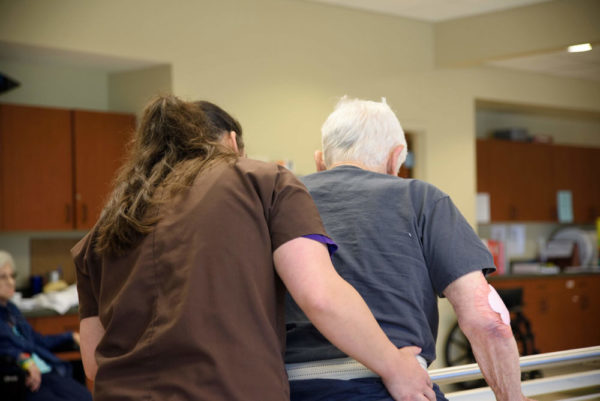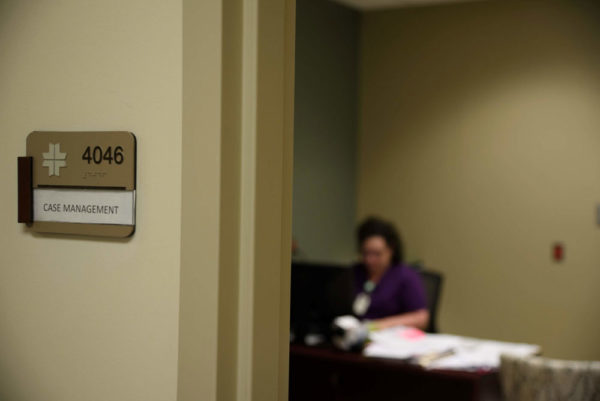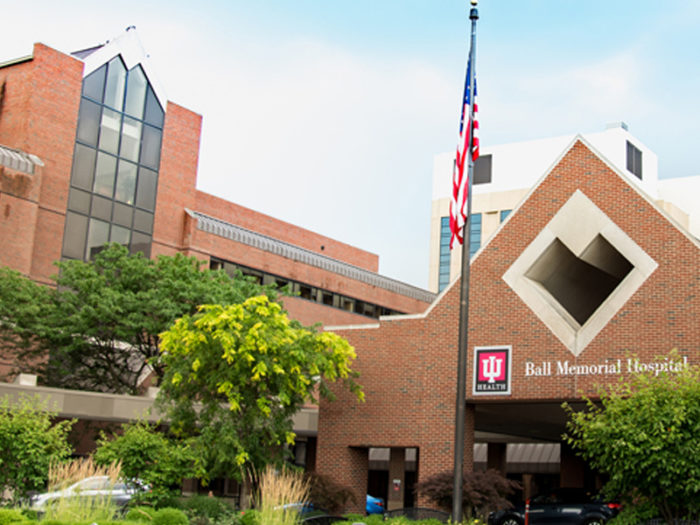How You Can Benefit from the ICU-Level Care of an LTACH
There are few things more frightening than not being able to breathe. Gasping for air is a horrible way to live life, and it’s heartbreaking to watch anyone go through it…and even worse for the person dealing with it.
Severe respiratory problems may present a need for additional assistance when it comes to breathing independently. When this happens, you or your loved one may need additional treatment beyond the initial hospital stay to fully recover and begin to breathe independently again.
In these situations, your doctor will refer you to a Long Term Acute Care Hospital (LTACH). At AMG, we specialize in helping patients recover from critical illnesses. That’s why we refer to our LTACHs as critical illness recovery hospitals. Our hospitals are the best choice for patients with severe pulmonary disorders, as we provide the care and rehabilitation necessary for recovery—however long that may take.
Any time you’ve experienced a serious injury, illness, or surgery, making healthcare decisions may seem stressful and confusing, especially in the case of pulmonary problems.
We want you to feel comfortable and confident in the next steps you take, so it probably makes sense to dig deeper into the services provided by a critical illness recovery hospital like ours and how that affects your care.
What is a Long Term Acute Care Hospital (LTACH)?
A Long Term Acute Care or Critical Illness Recovery Hospital provides care for patients with acute medical problems who require extended, intensive care to recover. While the name might make you think of a long-term care facility or nursing home, an LTACH is actually quite different.
These facilities are a hospital in every sense of the word, just highly specialized and focused on treating acute healthcare conditions that go beyond the scope of a traditional hospital.
An AMG critical illness recovery hospital offers the same level of care you receive in the ICU of a standard hospital. Our doctors, nurses, and physicians are trained to provide successful ventilator weaning and pulmonary rehabilitation so that you or your loved one can return to an optimal level of independence.
What type of care can I get from a critical illness recovery hospital?
AMG critical illness recovery hospitals provide acute or intense care for an average of 25 days per patient (pulmonary patients can expect an 18 to 25 day stay), whereas a hospital typically only treats patients for a few days. We also specialize in treating patients with very specific conditions, such as:
- Pulmonary or breathing problems, including patients who need oxygen support and airway maintenance
- Acute renal failure (ARF) or end-stage renal disease (ESRD)
- Open or non-healing wounds, ulcers, or sores
AMG critical illness recovery services can improve your pulmonary health with:
- Oxygen therapy through a variety of modalities
- Invasive ventilation through the use of a mechanical ventilator
- Non-invasive ventilation through the use of a C-Pap, Bi-Pap, or Vapotherm equipment
All AMG Critical Illness Recovery Hospitals are staffed with respiratory therapists who are trained and highly skilled in caring for patients with chronic and complex respiratory conditions.
LTACH versus an STACH, IRF, or SNF, how does it compare?
You’re probably wondering why your doctor would choose a long term acute care hospital (LTACH) over your other care options. The answer is simple: it all comes down to the type and length of care that each provides.
A Traditional Hospital | STACH
Let’s start out with your traditional hospital. These are also known as short-term acute care hospitals or STACHs.
The name tells you pretty much everything you need to know. An STACH provides short-term care for acute medical needs, meaning that they will help you with the initial medical emergency. These facilities are built to stabilize patients and diagnose their conditions. However, STACHs are not equipped to keep you for extended stays requiring intense care – that’s a job for a critical illness recovery hospital (LTACH).
In fact, the average stay in an STACH is just four to five days[1], whereas the average stay in an LTACH is 25 days[2].
This means that, at the time of discharge, pulmonary patients and those with other longer-term needs will not have received the full length of care necessary to make a complete recovery.
If you or a loved one require a ventilator for breathing assistance, it is highly unlikely that you will be off of the ventilator during your allowable stay at an STAC Hospital.
This is why your doctor may refer you to a critical illness recovery hospital like ours after your initial stay in a hospital. At facilities like ours, you’ll receive care aimed at continued stabilization and recovery.
A Rehabilitation Hospital | IRF (Facility)
Another care option beyond an STACH is an inpatient rehabilitation hospital, or an IRF. An IRF also provides hospital-level care; however, this type of hospital specializes in helping patients recover through intensive therapy.
In an IRF, you receive a minimum of 3 hours of a combination of physical, occupational, and speech therapy per day. Because of this, an IRF is the perfect choice if you are recovering from:
- Amputation
- Stroke
- Brain Injury
- Spinal Cord Injury
- Orthopedic Injuries and Surgeries
You may also have heard of a skilled nursing facility. A skilled nursing facility is different from the aforementioned care options in one critical way: it is only equipped to provide care for sub-acute conditions that no longer require intensive intervention.
The Nursing Home | SNF
In a skilled nursing facility, you receive around the clock medical care with skilled nursing services like:
- Wound care
- Injections
- IVs
- Physical therapy
However, the level of care needed by skilled nursing patients here is far less than that of LTACH or IRF patients. So, while skilled nursing facilities do focus on rehabilitation, they do not provide hospital-level care or daily doctor visits. Any IRF or critical illness recovery hospital will have daily doctor rounds, though.
What are the benefits of a critical illness recovery hospital for pulmonary patients?
Based on the level and length of care that a critical illness recovery hospital provides, it’s easy to see why your doctor may have suggested this for your post-hospital pulmonary care.
In an LTACH, you continue to receive the same expert, around the clock care that you were given in the traditional hospital… Specialists, including pulmonologists, make daily rounds, and you receive the respiratory therapy necessary to help you recover more fully and in the time that you need.
The expert team of respiratory therapists at critical illness recovery hospitals like AMG’s are also highly trained at ventilator weaning and will remain by your side throughout your journey, as you or your loved one relearn(s) to breathe and operate independently.
When you’re part of a pulmonary program at an LTACH, you experience a continuum of care to assess and treat your individual needs. Your multidisciplinary team will include:
- Pulmonologists
- Respiratory therapists
- Rehabilitation nurses
- Pulmonary, occupational, and speech therapists
- Case managers | Social Workers
Their goal is your recovery. Your team works with you and your family to provide the individualized treatment and education you need to be comfortable. The team will focus on strengthening and rehabilitating your lungs to greatly reduce or even eliminate your dependence on the ventilator, artificial airway, or another assistive breathing device.
Rehabilitation Therapies for Pulmonary Patients
During your stay at an AMG critical illness recovery hospital, you will receive more than just pulmonary rehabilitation.
You will receive physical therapy to help you regain strength and mobility, as well as occupational therapy in order to re-learn how to care for yourself independently and handle the activities that come with everyday life, such as:
- Grooming
- Bathing
- Feeding yourself
- Other life skills
Your team of occupational therapists will help you to compensate for any loss of function, by teaching you how to use assistive devices.
Since many pulmonary patients also experience problems with speech and swallowing following ventilator or artificial airway use, you’ll also receive speech therapy. After extubation, you may have temporary voice changes or throat problems, such as[3]:
- A weak voice
- A wispy voice
- A hoarse voice
- Difficulty projecting your voice
- A sore throat
- Dryness of the throat
- Difficulty swallowing
Your critical illness recovery hospital’s highly specialized team of speech therapists will help you overcome these issues. Your therapists will help you normalize your voice and teach you to swallow effortlessly. They will begin therapy as soon as possible to ensure the best outcome for you.
AMG and the Care You Need
At AMG Hospitals, we focus on providing the long-term acute care you need to more fully recover and regain an optimal level of independence following a serious illness, injury, or surgery. Our expert team of pulmonologists, therapists, nurses, and case managers create a treatment plan that addresses all aspects of your rehabilitation in order to help you live the highest quality life possible.
If you or your loved one is reliant on a ventilator, you can rest assured that you are in good hands with AMG. Our ventilator wean rate is substantially higher than the national average, and our average number of days for weaning is just 13.7 days compared to the 15-18-day national average.
At AMG, we embrace a multidisciplinary approach. Our respiratory team coordinates your care closely with your rehabilitation nurses and therapists to meet your unique medical needs and goals.
Our low patient-to-respiratory therapist ratio means you get the one-to-one attention you need to make progress every day on your journey to recovery.
The bottom line is that we are here to provide tailored pulmonary and respiratory rehabilitation services geared toward helping you reach an optimal level of health and independence. Contact us today to learn more about how we can help you on your road to recovery.
[1] https://www.seniorsbluebook.com/professionalservicesandresources/what-is-an-ltach/
[2] https://www.seniorsbluebook.com/professionalservicesandresources/what-is-an-ltach/
[3] https://www.guysandstthomas.nhs.uk/resources/patient-information/therapies/slt/voice-care-after-intubation-intensive-care.pdf


